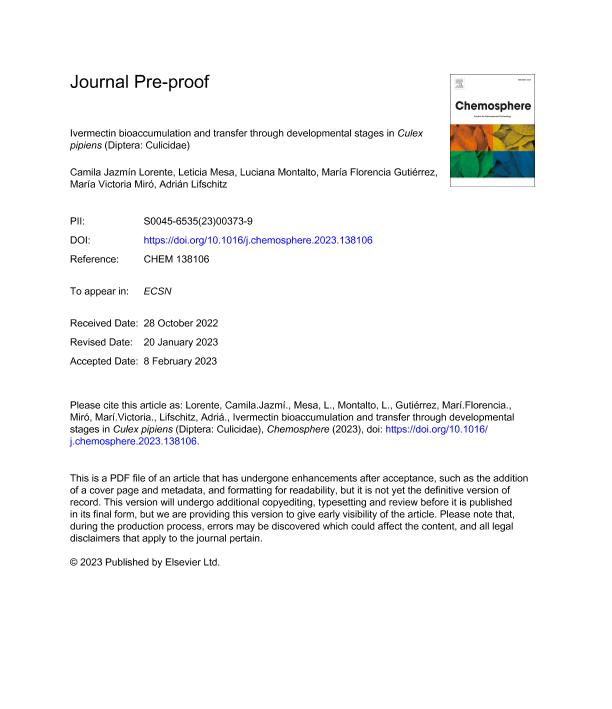Artículo
Ivermectin bioaccumulation and transfer through developmental stages in Culex pipiens (Diptera: Culicidae)
Lorente, Camila Jazmín; Mesa, Leticia Mariana ; Montalto, Luciana
; Montalto, Luciana ; Gutiérrez, Florencia María; Miró, María Victoria
; Gutiérrez, Florencia María; Miró, María Victoria ; Lifschitz, Adrian Luis
; Lifschitz, Adrian Luis
 ; Montalto, Luciana
; Montalto, Luciana ; Gutiérrez, Florencia María; Miró, María Victoria
; Gutiérrez, Florencia María; Miró, María Victoria ; Lifschitz, Adrian Luis
; Lifschitz, Adrian Luis
Fecha de publicación:
05/2023
Editorial:
Pergamon-Elsevier Science Ltd
Revista:
Chemosphere
ISSN:
0045-6535
Idioma:
Inglés
Tipo de recurso:
Artículo publicado
Clasificación temática:
Resumen
Ivermectin (IVM), one of the most widely used antiparasitics in livestock, could enters into the aquatic environment because the treated animal metabolizes only a small percentage of what is administered and the rest is eliminated through the feces, largely as a parent drug, imposing a risk to aquatic organisms. The aims of this study were to (1) assess the effect of IVM spiked in cattle dung on the survival and emergence of Culex pipiens (Diptera: Culicidae), and to (2) evaluate the accumulation of this drug in the different developmental stages of this taxon. Larvae were exposed to two IVM concentrations (T1: 1000 ng g−1 and T2: 500 ng g−1) for 9 days. At days 3, 6 and 9 survival and adult emergence were recorded and samples of larvae, pupae, pupal exuviae and adults were taken to analyze the IVM accumulation. At these concentrations, a reduction in survival and adult emergence of C. pipiens was recorded. In addition, the IVM accumulation was observed in all samples analyzed, decreasing it throughout the development of this taxon (larvae > pupae > adults). Although a large proportion of the drug was lost during the metamorphosis, being mainly eliminated through pupal exuviae during molting, this process is not enough to eliminate it completely. Thus, part of the drug was transferred to the adult stage and remains available to the aquatic and terrestrial food webs. These results show that IVM represents a risk to aquatic invertebrates and their predators, which deserves further studies, especially in the context of their bioaccumulation and biomagnification through the aquatic and terrestrial trophic webs.
Archivos asociados
Licencia
Identificadores
Colecciones
Articulos(CIVETAN)
Articulos de CENTRO DE INVESTIGACION VETERINARIA DE TANDIL
Articulos de CENTRO DE INVESTIGACION VETERINARIA DE TANDIL
Articulos(INALI)
Articulos de INST.NAC.DE LIMNOLOGIA (I)
Articulos de INST.NAC.DE LIMNOLOGIA (I)
Citación
Lorente, Camila Jazmín; Mesa, Leticia Mariana; Montalto, Luciana; Gutiérrez, Florencia María; Miró, María Victoria; et al.; Ivermectin bioaccumulation and transfer through developmental stages in Culex pipiens (Diptera: Culicidae); Pergamon-Elsevier Science Ltd; Chemosphere; 322; 5-2023; 1-31
Compartir
Altmétricas



